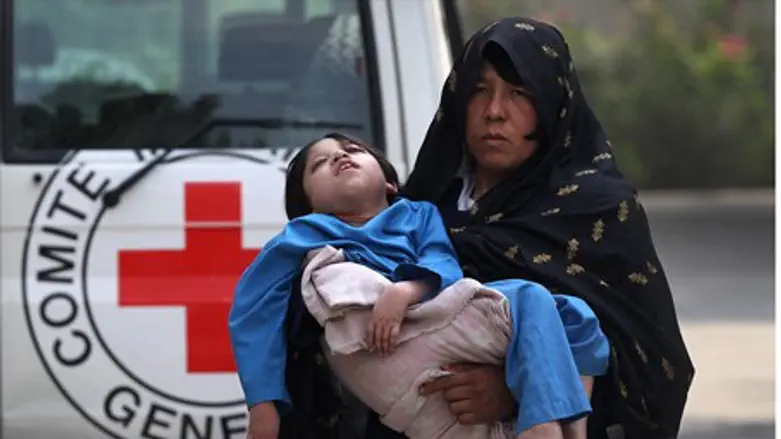
The President of the International Committee of the Red Cross (ICRC) has admitted the humanitarian agency failed to protect Jews during the holocaust because it "lost its moral compass."
At a joint event in Geneva with the World Jewish Congress to commemorate the 70th anniversary of the Allied liberation of Nazi death camps, ICRC President Peter Maurer stated that "the ICRC failed to protect civilians and, most notably, the Jews persecuted and murdered by the Nazi regime."
"It failed as a humanitarian organization because it lost its moral compass," he added.
The conference "Remembering the Shoah: The ICRC and the International Community's Efforts in Responding to Genocide and Protecting Civilians" focused on the ways in which legal and political responses to mass killings have developed since the Holocaust. It was attended by 200 senior members of Geneva’s diplomatic corps and also featured a panel discussion with Dorot Professor of Modern Jewish History and Holocaust Studies at Emory University Deborah Lipstadt and former International President of Médecins Sans Frontières James Orbinski.
Echoing Maurer's statement, WJC President Ronald S. Lauder said the Red Cross willfully ignored the Nazi genocide of Jews and other minority groups.
"World silence and indifference to the fate of the Jewish people led to the Holocaust. The Red Cross chose silence as well," he said.
"In the face of a human catastrophe, silence is not a moral alternative. As one of the most respected international organizations in the world, the ICRC has an important obligation that goes beyond relief work," Lauder continued. "Today, this is more important than ever because of what we see throughout the Middle East, Africa, and even right here in Europe."
During World War II, the ICRC, headquartered in Geneva, was the principal humanitarian institution maintaining communications with both the Allied and Axis powers. But while the ICRC did provide assistance and protection to Allied prisoners of war held by Nazi Germany, it did not do the same for Jewish deportees as Berlin refused all humanitarian requests to help Jewish victims.
At the same time, the ICRC refused to even publicly denounce the deportation of Jews to concentration camps.
In his address, Maurer admitted the Red Cross allowed itself to remain willfully blind to the horrors unfolding before it.
"The ICRC did not see Nazi Germany for what it was. Instead, the organization maintained the illusion that the Third Reich was a ‘regular partner’, a state that occasionally violates laws, not unlike any army during World War I, occasionally using illegal means and methods of warfare."
But, he insisted, it had learned from its past mistakes.
"We have chosen to confront our past and to embrace transparency. Our public archives are proof of our acknowledgment of the past and our continued effort to confront uncomfortable truths," he declared.
Maurer struck a far more pessimistic note however when it came to the more contemporary challenges facing his organization.
"For the ICRC, somehow, ‘never again’ resonates with difficulty because of what we see and experience on the ground every day," he said.
"We cannot guarantee that a humanitarian catastrophe of the extent of the Holocaust will not happen again. On the contrary, we witness a catalogue of atrocities, every day, in wars across the globe."
In his speech, Lauder commended the Red Cross for admitting and taking responsibility for its past failings, and urged the Red Cross to apply the lessons it learned to current and future challenged.
Simply providing apolitical medical and relief work is not enough, the WJC President insisted, calling on the ICRC to lead the charge in fighting the kinds of evil ideologies - from Nazism to radical Islam - which make atrocities such as the holocaust possible.
"I believe the International Red Cross has an important obligation that goes beyond relief work," he said. "The ICRC is one of the most respected international organizations in the world and as such, its opinion carries great weight."
"You have already proven your moral authority because you have opened up your historical records. You have admitted that you could have and should have done more."
The world is "in desperate need of leadership in the ongoing debate between right and wrong," he continued, "and that is exactly what this is: a struggle between good and evil."
"There is no ambiguity when marauding armies kill everything in their path, beheading men, women and even children. This could not be clearer, just as it was clear 70 years ago when the concentration camps were liberated.
"The world today faces its greatest challenge since the end of World War II. Nothing could be more important in 2015. The International Committee of the Red Cross must show the world the way."